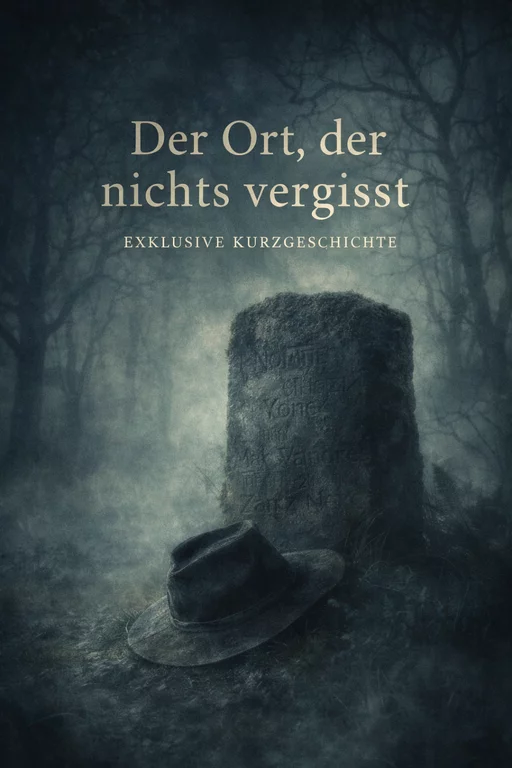✨ BONUSGESCHICHTE

Der Ort, der nichts vergisst
Niemand wusste mehr, wann
der Platz entstanden war.
Er lag abseits der Wege,
dort, wo der Wald dichter wurde und der Boden selbst im Sommer
kühl blieb. Kein Schild wies auf ihn hin. Keine Karte
verzeichnete ihn. Und doch fanden ihn manche Menschen, ohne
danach gesucht zu haben.
Der Stein stand mitten auf
der Lichtung.
Alt. Rissig. Von Moos
überzogen.
Wer genauer hinsah, erkannte
Linien darin – eingeritzte Zeichen, ungleichmäßig, hastig, als
seien sie nicht von einer Hand, sondern von einer Angst geführt
worden.
Man sagte, der Stein trage
Namen.
Nicht alle waren sichtbar.
Manche erschienen nur im richtigen Licht. Andere erst, wenn man
lange genug schwieg.
Die Alten erzählten, dass
der Ort früher gemieden wurde.
Nicht aus Furcht vor
Geistern oder Hexen – sondern vor dem, was blieb.
Denn hier blieb
alles.
Worte, die nie ausgesprochen
worden waren.
Blicke, die man abgewendet
hatte.
Schuld, die man
weitergereicht hatte wie ein Erbstück.
Wer den Stein berührte,
spürte zuerst nichts.
Dann ein Ziehen in der
Brust.
Dann Erinnerungen, die nicht
die eigenen waren.
Eine Frau hatte hier einmal gestanden – so hieß es – mit gefalteten Händen und gesenktem Kopf. Sie hatte nichts gesagt, doch der Stein hatte geantwortet. Später konnte sie nie erklären, warum sie wusste, was sie wusste. Nur, dass manche Wahrheiten nicht gelernt, sondern erinnert werden.
Der Wind bewegte sich anders
an diesem Ort.
Er trug keine Blätter fort,
sondern Stimmen.
Flüstern ohne Sprache.
Fragen ohne Antwort.
Und manchmal – selten – lag
etwas am Fuß des Steins.
Ein alter
Knopf.
Ein Stück
Stoff.
Ein Hut.
Niemand wagte es, ihn mitzunehmen.
Denn der Hut gehörte
niemandem mehr.
Und doch hatte ihn jemand
getragen.
Die, die den Ort verließen,
sprachen nie darüber.
Aber sie gingen
langsamer.
Sahen genauer
hin.
Und wussten, dass Vergessen
keine Erlösung ist – nur eine Verzögerung.
Der Stein steht noch immer
dort.
Er wartet
nicht.
Er ruft nicht.
Er erinnert.
Und das genügt.
